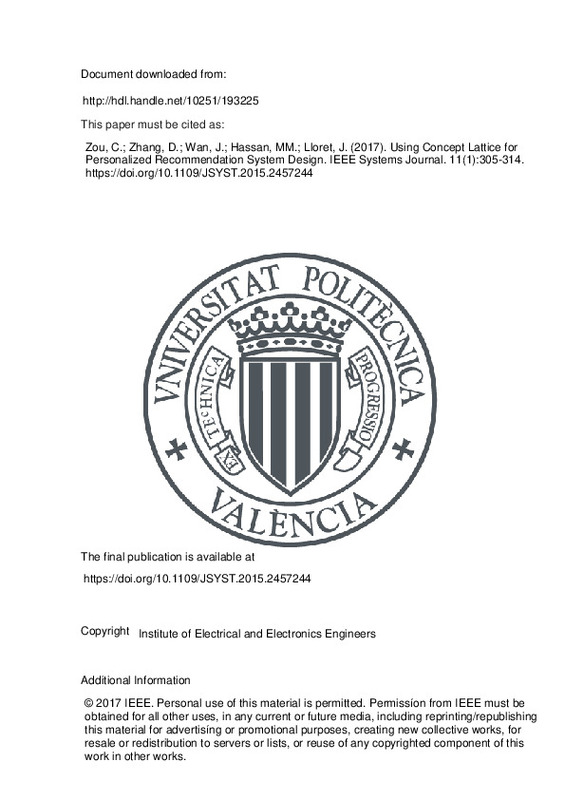JavaScript is disabled for your browser. Some features of this site may not work without it.
Buscar en RiuNet
Listar
Mi cuenta
Estadísticas
Ayuda RiuNet
Admin. UPV
Using Concept Lattice for Personalized Recommendation System Design
Mostrar el registro sencillo del ítem
Ficheros en el ítem
| dc.contributor.author | Zou, Caifeng
|
es_ES |
| dc.contributor.author | Zhang, Daqiang
|
es_ES |
| dc.contributor.author | Wan, Jiafu
|
es_ES |
| dc.contributor.author | Hassan, Mohammad Mehedi
|
es_ES |
| dc.contributor.author | Lloret, Jaime
|
es_ES |
| dc.date.accessioned | 2023-05-08T18:02:18Z | |
| dc.date.available | 2023-05-08T18:02:18Z | |
| dc.date.issued | 2017-03 | es_ES |
| dc.identifier.issn | 1932-8184 | es_ES |
| dc.identifier.uri | http://hdl.handle.net/10251/193225 | |
| dc.description | © 2017 IEEE. Personal use of this material is permitted. Permissíon from IEEE must be obtained for all other uses, in any current or future media, including reprinting/republishing this material for advertisíng or promotional purposes, creating new collective works, for resale or redistribution to servers or lists, or reuse of any copyrighted component of this work in other works. | es_ES |
| dc.description.abstract | [EN] A novel personalized recommendation system (PRS) based on concept lattice is proposed and used to discover valuable information according to users' requirements and interests quickly and efficiently. The system is divided into the offline part and the online part. In the offline part, the formal context and the concept lattice are constructed from the transaction database, and the association rules based on concept lattice are extracted and stored in the rule library. The new added data are used to update the concept lattice and the rule library regularly. In the online part, the behavior data of target user, the concept lattice and the rule library are used to calculate the ordered recommendation results, which are returned to the user. There are two recommendation methods in the online part, which are recommendations based on association rules and collaborative filtering recommendation. Because of the natural advantages of the concept lattice in data processing and analysis, the PRS we designed possesses better precision and faster response capability, as compared with conventional recommendation system. | es_ES |
| dc.description.sponsorship | This work was supported by the Deanship of Scientific Research, King Saud University, Riyadh, through the International Research Group Project IRG: 14-17. | es_ES |
| dc.language | Inglés | es_ES |
| dc.publisher | Institute of Electrical and Electronics Engineers | es_ES |
| dc.relation.ispartof | IEEE Systems Journal | es_ES |
| dc.rights | Reserva de todos los derechos | es_ES |
| dc.subject | Association rule extraction | es_ES |
| dc.subject | Collaborative filtering | es_ES |
| dc.subject | Recommendation | es_ES |
| dc.subject | Concept lattice | es_ES |
| dc.subject | Formal concept analysis (FCA) | es_ES |
| dc.subject | Personalized recommendation system (PRS). | es_ES |
| dc.subject.classification | INGENIERÍA TELEMÁTICA | es_ES |
| dc.title | Using Concept Lattice for Personalized Recommendation System Design | es_ES |
| dc.type | Artículo | es_ES |
| dc.identifier.doi | 10.1109/JSYST.2015.2457244 | es_ES |
| dc.relation.projectID | info:eu-repo/grantAgreement/KSU//IRG:14-17/ | es_ES |
| dc.rights.accessRights | Abierto | es_ES |
| dc.contributor.affiliation | Universitat Politècnica de València. Escuela Politécnica Superior de Gandia - Escola Politècnica Superior de Gandia | es_ES |
| dc.description.bibliographicCitation | Zou, C.; Zhang, D.; Wan, J.; Hassan, MM.; Lloret, J. (2017). Using Concept Lattice for Personalized Recommendation System Design. IEEE Systems Journal. 11(1):305-314. https://doi.org/10.1109/JSYST.2015.2457244 | es_ES |
| dc.description.accrualMethod | S | es_ES |
| dc.relation.publisherversion | https://doi.org/10.1109/JSYST.2015.2457244 | es_ES |
| dc.description.upvformatpinicio | 305 | es_ES |
| dc.description.upvformatpfin | 314 | es_ES |
| dc.type.version | info:eu-repo/semantics/publishedVersion | es_ES |
| dc.description.volume | 11 | es_ES |
| dc.description.issue | 1 | es_ES |
| dc.relation.pasarela | S\376300 | es_ES |
| dc.contributor.funder | King Saud University | es_ES |







![[Cerrado]](/themes/UPV/images/candado.png)

